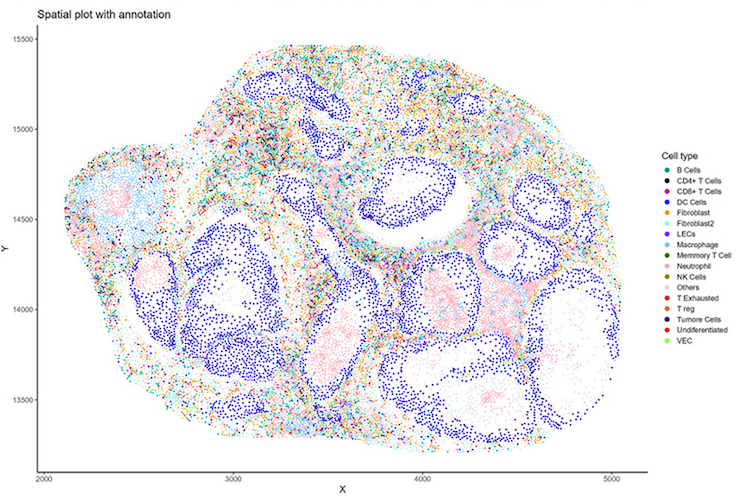New AI tool created by VCU researchers could lead to more personalized treatments for patients
By analyzing millions of cells in minutes, a new tool called TACIT can help doctors diagnose diseases and get patients personalized treatments faster.
July 10, 2025 Threshold-based Assignment of Cell Types from Multiplexed Imaging Data (TACIT) is an AI tool developed by VCU researchers. They hope it can help doctors figure out what kind of treatments work best for an individual patient. (Getty Images)
Threshold-based Assignment of Cell Types from Multiplexed Imaging Data (TACIT) is an AI tool developed by VCU researchers. They hope it can help doctors figure out what kind of treatments work best for an individual patient. (Getty Images)
By Bill Potter and Sara McCloskey
Analyzing the cells in a tissue sample usually takes weeks, but a new tool developed by researchers at VCU Massey Comprehensive Cancer Center uses artificial intelligence to do it in minutes.
The Threshold-based Assignment of Cell Types from Multiplexed Imaging Data (TACIT) is faster and more accurate than similar programs, which means doctors will soon be able to more quickly diagnose and prescribe medications better tailored to an individual patient's needs.
TACIT was developed by Jinze Liu, Ph.D., a Massey researcher and professor in the Department of Biostatistics at the Virginia Commonwealth University School of Public Health, and Kevin Matthew Byrd, D.D.S., Ph.D., an associate Massey researcher and assistant professor of oral and craniofacial molecular biology at the VCU School of Dentistry.
How does TACIT work?
In a matter of minutes, TACIT can take a tissue sample and compare it to a database of more than 5 million cells from across the body, such as the brain, mouth and digestive system. This allows doctors and researchers to identify specific cell markers for different organs and their diseases.
This type of analysis used to take several weeks – even up to a month. By comparing a larger swath of cells, TACIT can give researchers and doctors a better idea of what is happening in a patient’s body and what kind of treatments might work best for that individual.
"We joke that TACIT is like a Rosetta Stone,” Byrd said. “You can see how all these different data types all become the same language, and for us, we can build upon that.”

VCU researchers created a new tool called TACIT that uses advanced computer models to identify different kinds of cells in tissues faster and more accurately than ever before. (Contributed photo)
How does this tool impact patient care?
This tool impacts patient care in three main areas: faster diagnosis, finding the best treatment options and new discoveries.
- Diagnosis: By using this AI tool, doctors can quickly diagnose a patient based on their specific biological make up because TACIT can analyze different tissue samples and test data from genetics and proteins all at once. Having a diagnosis faster can get a patient in treatment faster too.
- Treatment: With the analysis from TACIT, doctors also identify which FDA-approved treatments might work best for a specific patient based on their profile. It also improves how patients are matched to clinical trials, avoiding unnecessary treatments and improving trial success.
- Research: With a tool like this, researchers can get a better idea of what is happening in the body. This can help researchers find new connections between cells and different diseases, opening the door to entirely new treatments.
What’s next for this research?
Byrd and Liu’s research on TACIT was recently published in Nature Communications. The tool has been submitted for a patent and is already being tested in multiple research projects at VCU. It’s showing promise in areas far beyond cancer.
“We’re using artificial intelligence to increase efficiency and also the accuracy of diagnosis,” Liu said. “And as we gain more data, TACIT’s ability to increase positive patient outcomes will only multiply.”
Learn more about our innovative researchers and their projects




